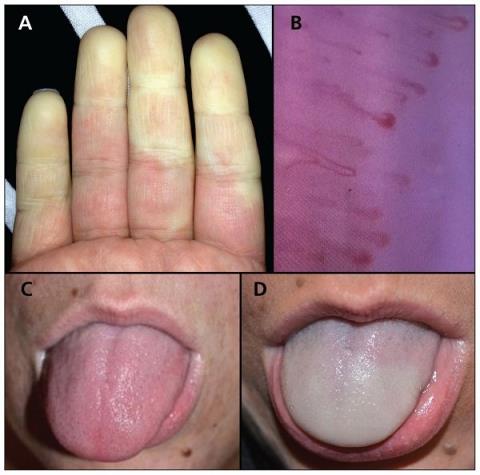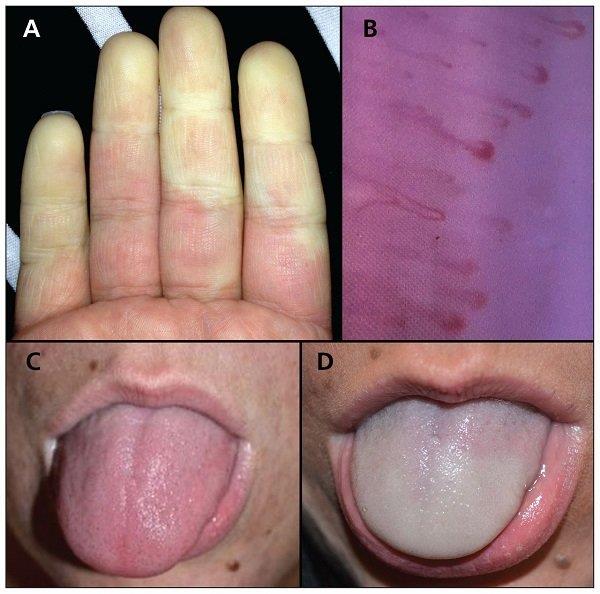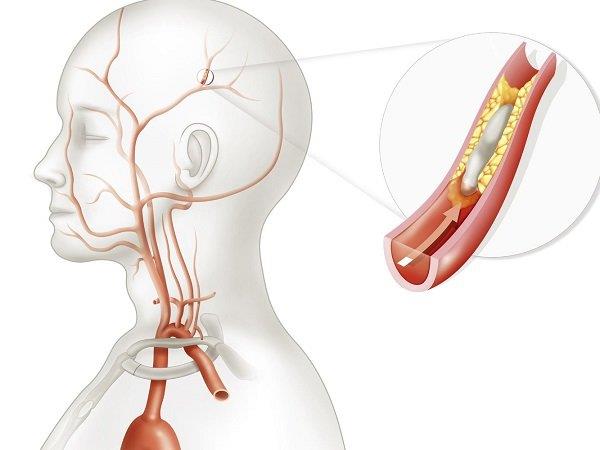Numbness of the tongue and related diseases

Your tongue suddenly feels weird. It tingles like a needle is in its mouth. You feel like your tongue is numb. Is this worrisome? Let's read the following article of SignsSymptomsList to learn about this issue!
content
- Is tongue numbness worrisome?
- Causes of tongue numbness
- See your doctor if tongue numbness is accompanied by the following symptoms
Is tongue numbness worrisome?
Tongue numbness is not usually a cause for concern. This symptom may go away on its own in a short time.
There are many causes of tongue numbness. One possibility is due to a phenomenon called Raynaud's. This is a disorder that often causes decreased blood flow to the fingers, toes, or less commonly, the lips and tongue. When the tongue is cold or you are stressed, the blood vessels that feed it often narrow. In people with Raynaud's phenomenon, this vasoconstriction response is even stronger, causing temporary obstruction of blood flow. This causes the tongue to become discolored and appear paler and paler. During and after this, your tongue may be briefly numb.
Raynaud 's phenomenon can be uncomfortable but not dangerous. There is no obvious cause for this phenomenon. This also does not mean that you have any serious health problems. If you notice signs on your tongue, they almost always go away when you drink warm water or rest.
Raynaud's phenomenon is often repeated. If you notice temporary discoloration of the tongue, take pictures and show it to your doctor so he can confirm the diagnosis. It is important to find out if there is another medical condition that causes the same phenomenon.

Raynaud's phenomenon can cause numbness in the limbs or tongue
Causes of tongue numbness
Tongue numbness can be caused by the following:
Allergic reactions numbing the tongue
Allergic reactions to foods or chemicals or medications you take can cause your tongue to become swollen, itchy, and numb.
Food allergies occur when the immune system mistakenly thinks that common foods are harmful.
Common foods that trigger allergies are:
- Egg.
- Peanuts and tree nuts.
- Fish.
- Shellfish.
- Milk.
- Wheat.
- Soy bean.
Some adults who are allergic to pollen may experience swelling or numbness in their tongue when they eat certain vegetables and fruits, such as melons, celery, or peaches. This reaction causes the mouth to become irritated and causes the mouth, lips and tongue to become numb and swollen. If you notice that your mouth or tongue is numb after eating certain foods, avoid using them in the future.
If you have any of the following symptoms, call 911 immediately. It could be a sign of a serious and life-threatening allergic reaction:
- Wheezing or difficulty breathing.
- Hoarseness or tightness in the throat.
- Swelling of the lips or mouth.
- Itchy.
- Hives.
- Difficulty swallowing .
Drug allergies can also cause the tongue to become swollen, itchy, and numb. Antibiotics are often the drugs that cause allergies, but any drug can trigger an allergy. If you notice unusual symptoms after taking a new medication, contact your doctor immediately.
Mouth Sores
Canker sores are small, shallow, oval-shaped sores that can form on the tongue, inside the cheeks, or on the gums. Although it is not clear what causes mouth sores, factors such as trauma, hormonal changes, viruses, poor nutrition, allergies also play a role. Mouth sores are usually painful, but they usually clear up on their own within a week.
When you have mouth sores, don't eat hot, spicy foods as they can further irritate the sores. To ease the pain, you can gargle with salt water.

Mouth Sores
Low blood calcium
In hypocalcemia , the level of calcium in your blood drops below the normal range. This can cause numbness in the tongue and lips. However, you will often experience other symptoms first, such as:
- Convulsions and muscle stiffness.
- Numbness around the mouth and fingers and toes.
- Dizzy.
If you have the above symptoms and think hypocalcemia is the cause of your tongue numbness, see your doctor. A simple blood test can confirm this diagnosis. Symptoms of hypocalcemia usually go away when the underlying cause is treated and calcium-containing supplements are added.
Vitamin B deficiency
Lack of vitamin B12 or vitamin B9 can cause sore and swollen tongue, affecting taste. You may also experience numbness in your tongue and hands and feet. At the same time, you feel tired easily because these B vitamins are needed to make red blood cells for the blood and nourish the nerves. A lack of these vitamins can lead to anemia.
Vitamin B deficiency is usually caused by not getting enough of this vitamin in the diet or by a reduced ability to absorb these vitamins from food.
Good sources of B12 include fish, meat, eggs and dairy. Vegetarians may be deficient in vitamins if they do not eat fortified foods such as milk, cereals, breads, etc. Sources of vitamin B9 can be found in green vegetables, beans, tomatoes and orange juice.

Vitamin B deficiency can cause tongue numbness
See your doctor if tongue numbness is accompanied by the following symptoms
Sometimes tongue numbness can be a sign of a stroke or ischemic stroke.
You need to go to the emergency room right away if any of the following symptoms accompany tongue numbness:
- Weakness or numbness in an arm, leg, or face or side of the body
- Distorted face
- Difficulty speaking
- Confusion or dementia
- Blurred vision
- Dizziness or loss of balance
- Severe headache
Signs of cerebral ischemia may last only a few minutes but are still very serious. Stroke and ischemic stroke are medical emergencies. Call 911 right away if you suspect a stroke or ischemic stroke.

Tongue numbness can be caused by stroke and cerebral ischemia
Tongue numbness, if it occurs suddenly and is accompanied by signs of a stroke, requires immediate medical attention. Other cases of tongue numbness occur occasionally and when the cause can be identified, usually resolve on their own. If numbness of the tongue causes a lot of discomfort and lasts a long time, then you need to see a doctor for the best advice.